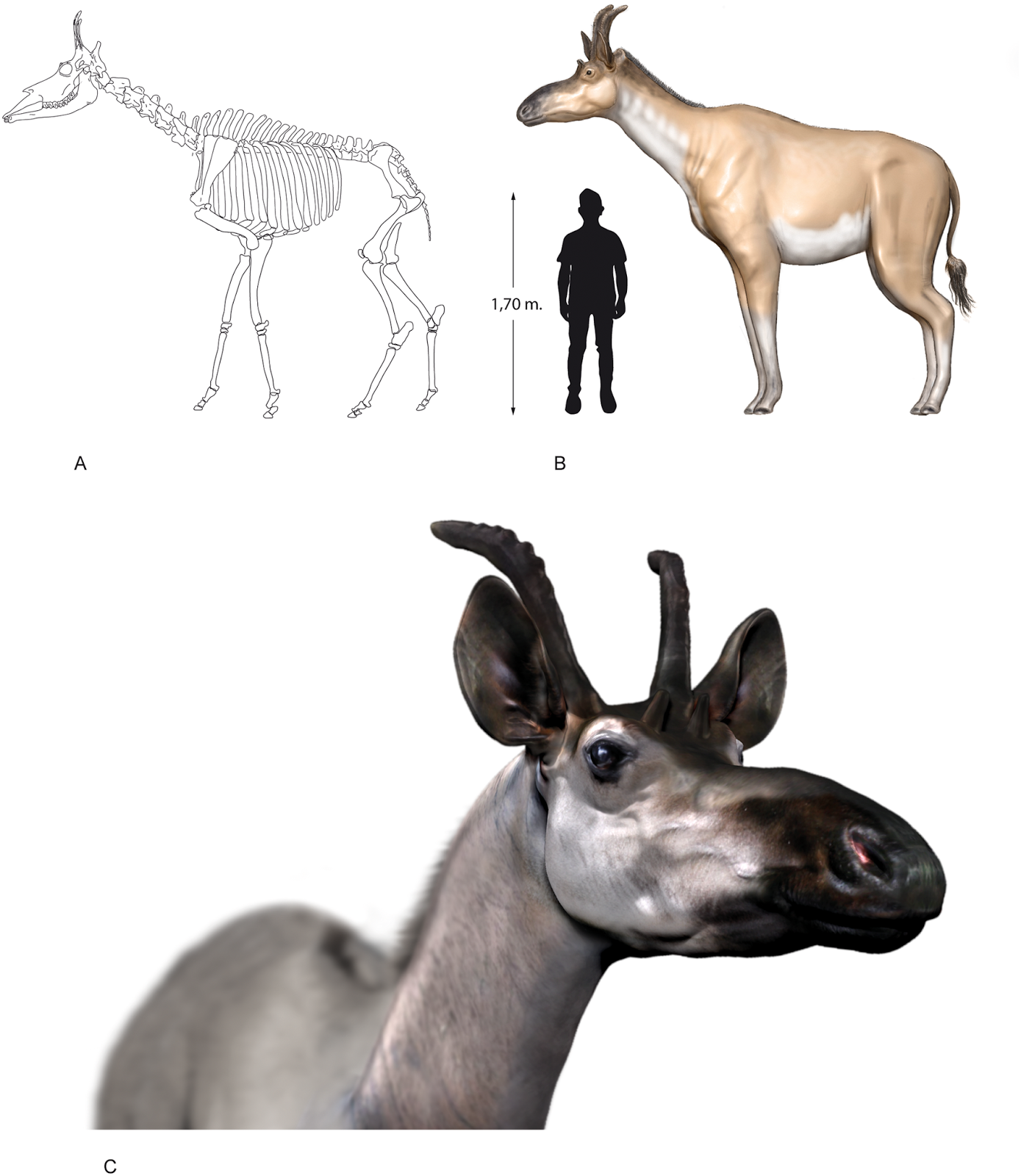Another gap filled; another 'intermediate form' found!
So, do creationists give up with their disinformation, misrepresentation and downright lies? What do you think?
Of course not! It's just one more thing to misrepresent and lie about. A literal interpretation of the Bible says it shouldn't exist, so it doesn't exist! End of! FACT!
Anyway, back to the real world.
According to this report in the New York Times:
A near-perfect fossil unearthed close to Madrid appears to be an ancient European ancestor of giraffes, representing a new species in the family and one that had two sets of bony bumps on its head rather than the single set of modern giraffes.
Older fossils in the family known as giraffids have been found before, but none in such pristine condition, said Ari Grossman, an associate professor of anatomy at Midwestern University in Glendale, Ariz., who was not involved in the finding but said the whole field would benefit from it.
The excavation was carried out over almost ten years by a Spanish team from Departamento de Paleobiología, Museo Nacional de Ciencias Naturales-CSIC, Madrid and Departmento de Faunas del Neógeno y Cuaternario, Institut Català de Paleontologia- Miquel Crusafont, Barcelona, led by Maria Ríos.
As well as a near perfect complete individual skeleton, they also unearthed three more incomplete skeletons.
Abstract
Giraffids include the only living giraffomorph ruminants and are diagnosed by the presence of bi-lobed canines and a special type of epiphyseal cranial appendages called ossicones. The family Giraffidae ranges from the latest early Miocene until today. However they are currently extant relics with only two living representatives, the African genera Okapia and Giraffa. Giraffids were much more diverse and widespread in the past, with more than 30 fossil species described. For the past decades a number of studies intended to resolve the phylogenetic relationships of the family, but due to the lack of really good cranial material no clear consensus was reached regarding the phylogenetic relationships amongst the different members of the group. The exceptionally complete remains of a new large giraffid from the late Miocene of Spain, Decennatherium rex sp. nov., allows us to improve and reassess giraffid systematics, offering a lot of new data, both anatomic and phylogenetic, on the large late Miocene giraffids of Eurasia. The results of our cladistic analysis show Decennatherium as a basal offshoot of a clade containing the gigantic samotheres and sivatheres, characterized by the presence of a Sivatherium-like ossicone-plan among other features. Decennatherium thus offers the most ancient evidence of this Sivatherium-plan and firmly establishes the early morphological patterns of evolution of a sivathere / samothere-clade that is defined as the less inclusive clade that contains Decennatherium and Sivatherium. Finally, this large group of four-ossiconed giraffids evolutionarily links Miocene Europe and Africa indicating vicariance / migration processes among the giraffid genetic pools separated by the Mediterranean Sea.
Ríos M, Sánchez IM, Morales J (2017)
A new giraffid (Mammalia, Ruminantia, Pecora) from the late Miocene of Spain, and the evolution of the sivathere-samothere lineage.
PLoS ONE12(11): e0185378. https://doi.org/10.1371/journal.pone.0185378
Copyright: © 2017 Ríos et al.
Published open access
Reprinted under the terms of a Creative Commons Attribution 4.0 International (CC BY 4.0)
This once widespread species from Eocene Europe shows some sexual dimorphism and still had the short neck rather than the long neck that is characteristic of the African giraffes of today and so was more like the related okapi, also of Africa.
Biologically, the interesting discovery is that this early giraffe had four ossicones - the bony knobs on their heads that are not really horns nor antlers. These, along with double-lobed canine teeth are the defining characteristics of this order rather than the long necks of the modern African giraffes. In male Decennatherium, the rear ossicones were larger than the front pair and were about sixteen inches long while the female's were only about two inches long. They were assumed to play a role in male competition for females but the fact that female Decennatheria also had them casts some doubt on this. Male Decennatheria stood about 9 feet tall and weighed about two tonnes, resembling a robust okapi with long horns.
The number and diversity of this order from the European Eocene strongly suggests that Europe may have been the ancestral homeland of this order. In addition to the two species found in Spain, Decennatherium and Sivatherium, eight different species have been found from the same era on the Greek island of Samos near Turkey. Altogether there have been about thirty different giraffids from Eurasia.
But of course, this is just another of those 'non-existent transitional forms' so far as creationists are concerned. They simply aren't there because no-one saw one giving birth to a modern giraffe and the Bible doesn't mention evolution. It's a shame that they are so terrified of upsetting their imaginary friend that they have to feign blindness and pretend not to see what's staring them in the face. There is something deeply wrong about a cult that requires its members to try to detach themselves from so much of the wonder of the natural world whilst purporting to worship what they believe was the creator of it.
'via Blog this'



No comments :
Post a Comment
Obscene, threatening or obnoxious messages, preaching, abuse and spam will be removed, as will anything by known Internet trolls and stalkers, by known sock-puppet accounts and anything not connected with the post,
A claim made without evidence can be dismissed without evidence. Remember: your opinion is not an established fact unless corroborated.